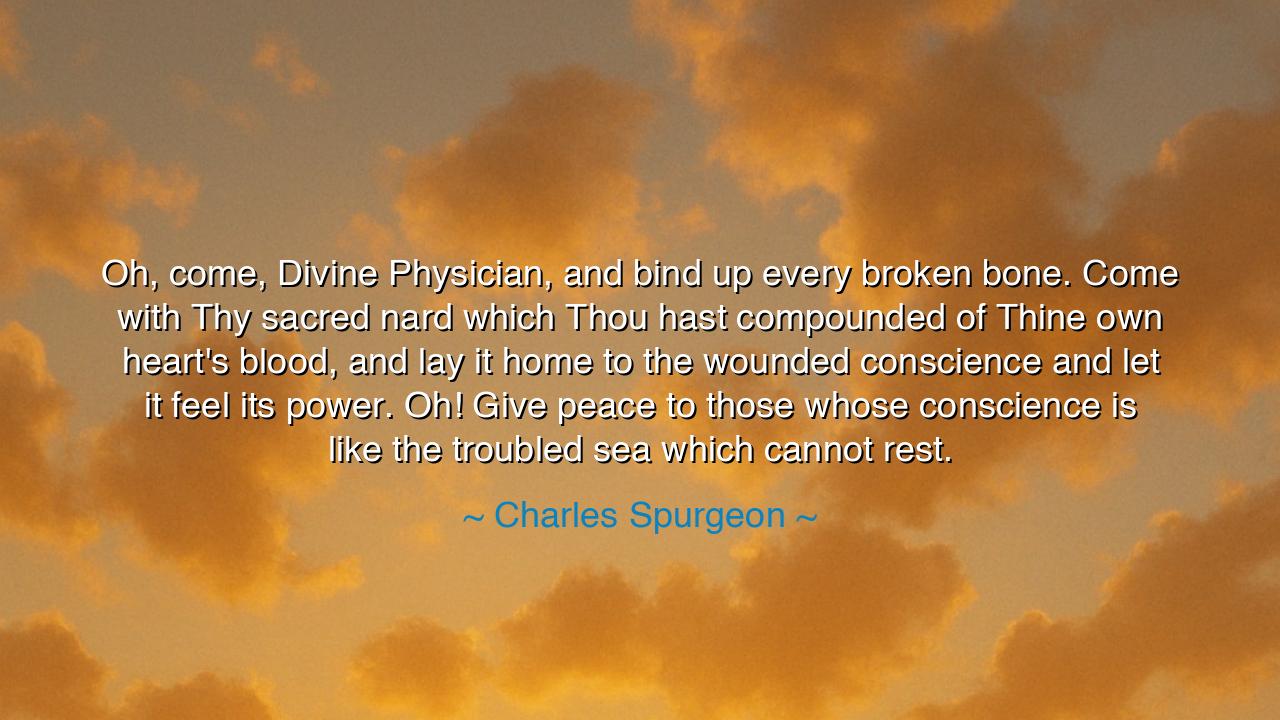
Oh, come, Divine Physician, and bind up every broken bone. Come
Oh, come, Divine Physician, and bind up every broken bone. Come with Thy sacred nard which Thou hast compounded of Thine own heart's blood, and lay it home to the wounded conscience and let it feel its power. Oh! Give peace to those whose conscience is like the troubled sea which cannot rest.






In the tender and soul-stirring words of Charles Spurgeon, the “Prince of Preachers,” there echoes a cry that transcends time and faith: “Oh, come, Divine Physician, and bind up every broken bone. Come with Thy sacred nard which Thou hast compounded of Thine own heart’s blood, and lay it home to the wounded conscience and let it feel its power. Oh! Give peace to those whose conscience is like the troubled sea which cannot rest.” In these words, we hear not merely the prayer of a preacher, but the eternal plea of the human heart—for healing, for peace, and for the mending of that which sorrow and guilt have shattered. Spurgeon calls upon the Divine Physician, a name given to Christ, not only as Savior but as Healer of both body and soul, the One who tends to the wounds unseen by mortal eyes—the wounds of the conscience.
Charles Haddon Spurgeon, born in 1834 in England, was a preacher whose sermons carried the power of the prophets. His words reached millions, and his faith shone in an age of doubt and industrial unrest. Yet Spurgeon was not a man untouched by pain; he knew depression, loss, and physical affliction. His plea here rises from that deep well of empathy—for he had himself known what it is to live with a troubled conscience, to feel the sea of the soul tossed by tempests of guilt, fear, and despair. In this passage, he invokes Christ not as a distant ruler, but as the Physician of broken hearts, the One whose very blood becomes the medicine for human misery.
To understand Spurgeon’s image of nard compounded of the heart’s blood, we must recall the ancient custom of anointing with oil—a sacred act of healing and consecration. In the Gospels, we find Mary of Bethany, who broke her alabaster jar of precious ointment—nard—and poured it upon Christ’s feet, an act of love so pure that it filled the house with fragrance. Spurgeon reverses this image, envisioning Christ as the One who breaks open His own heart, pouring out His lifeblood as the balm of salvation. This is the deepest symbol of Christian love: that God heals the world not by power, but by sacrifice, not by crushing evil, but by absorbing it and transforming it into mercy. His blood becomes the medicine of the soul—the essence of divine compassion distilled into a single act of grace.
When Spurgeon speaks of the wounded conscience, he speaks to all of humanity. For every person, no matter how righteous they appear, carries within them the scars of choices made, wrongs done, or kindness withheld. The conscience, when awakened, can become both light and torment—it reveals truth, but also exposes the pain of failure. Spurgeon likens such a soul to the troubled sea, a biblical image found in Isaiah 57:20: “The wicked are like the troubled sea, when it cannot rest, whose waters cast up mire and dirt.” The restless conscience is tossed endlessly by regret and fear, until it finds an anchor in divine forgiveness. Only the Divine Physician, he says, can calm such waters, can speak as Christ once did on Galilee, “Peace, be still,” and bring stillness to the storm within.
This imagery finds living expression in the story of John Newton, the former slave trader who later wrote the hymn Amazing Grace. Newton’s conscience, once hardened by cruelty, became a sea of torment when the light of faith broke upon him. He spent years haunted by the cries of those he had enslaved, but it was through that suffering that he came to repentance and transformation. When he wrote, “I once was lost, but now am found; was blind, but now I see,” he had felt exactly what Spurgeon describes—the binding of the broken, the anointing of the conscience with the balm of divine mercy. Newton found peace not by denying his guilt, but by surrendering it to the Physician who heals by love.
There is a deeper wisdom here that reaches beyond creed. To seek healing of the conscience is to admit that there is something sacred within us that longs for harmony with truth. Whether one names that truth God, Love, or Goodness, it is the same impulse—to be restored, to be made whole, to find rest from the storm. Spurgeon’s prayer teaches that such peace does not come through pride or pretense, but through humility—through the willingness to be healed, to let the heart be touched by compassion greater than its own.
So, my children of the restless world, hear this ancient plea anew: “Come, Divine Physician.” When your heart is heavy with regret, when your mind is weary with guilt, when you feel the sea within you rising in waves of fear—do not seek to silence it with distraction or denial. Instead, open the wound to healing. Speak honestly of your pain, forgive yourself as you would another, and let love—divine or human—pour over you like sacred oil. For the conscience, once healed, becomes not a sea of storm, but a well of light, calm, and clarity.
Thus, as Charles Spurgeon teaches, the greatest miracle is not the healing of the flesh, but the restoration of the soul. When we invite the Divine Physician into our hearts, we find that peace is not the absence of guilt, but its transformation—the alchemy of sorrow into wisdom, of wounds into compassion, and of brokenness into grace. And in that peace, the troubled sea rests, the storm ceases, and the spirit rises whole once more.






AAdministratorAdministrator
Welcome, honored guests. Please leave a comment, we will respond soon